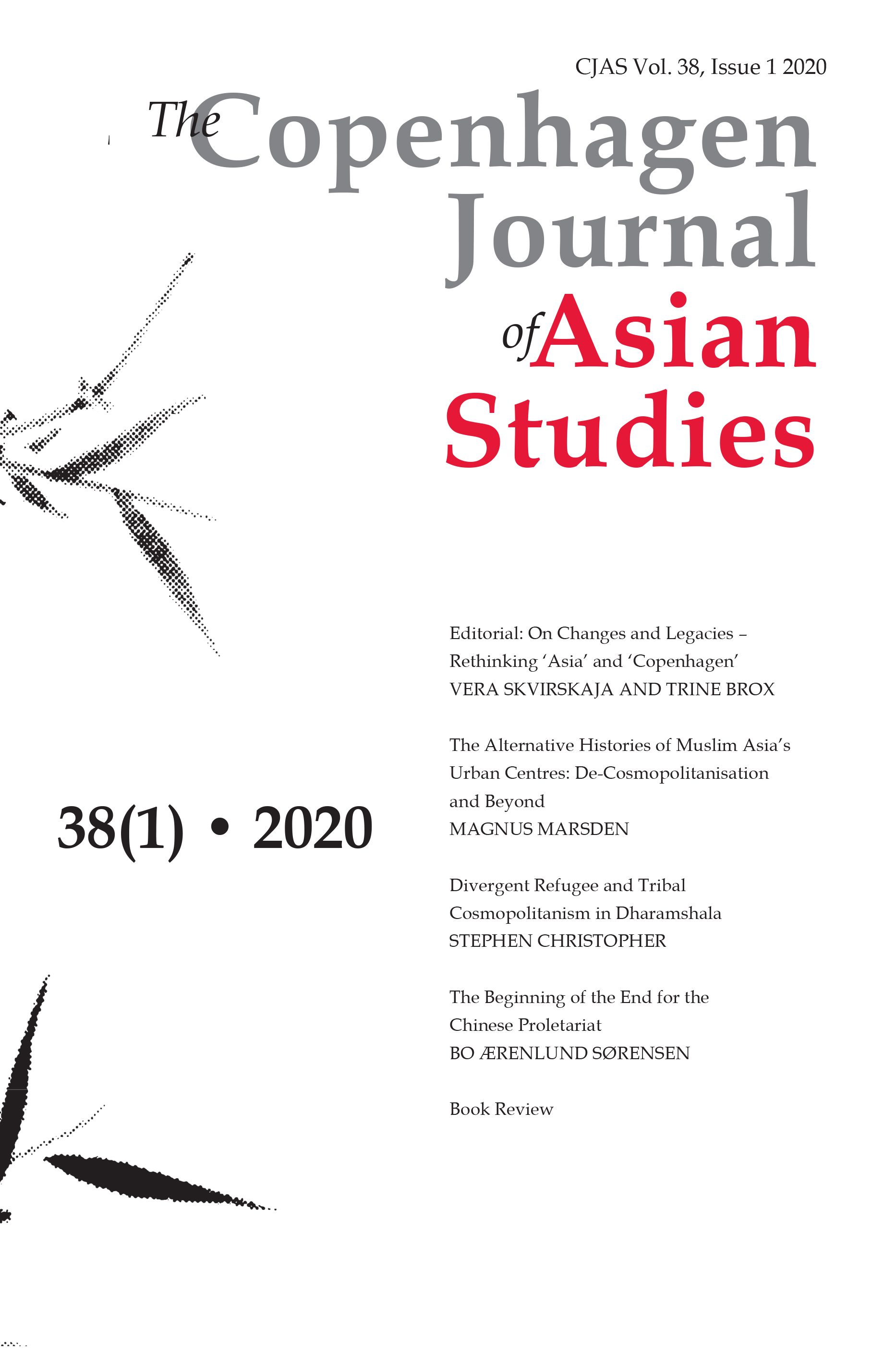The Beginning of the End for the Chinese Proletariat
DOI:
https://doi.org/10.22439/cjas.v38i1.6061Keywords:
media, post-Mao economic reforms, People’s Daily, incentive wages, employment securityAbstract
This article examines how China’s Communist Party (CCP) sought to justify its policies fostering inequality at the urban factory floor in the early years after Mao’s death through publications in the People’s Daily. The article focuses on three issues that emerged frequently in the newspaper: the increased prevalence of incentive wages, the abolishment of life-time employment for workers and the evolving discourse related to worker influence at their workplace. The article shows that the People’s Daily did not simply seek to persuade the public that the reforms were compatible with socialism, the newspaper also took great care to showcase which kinds of behaviours and emotions would be appropriate for the new working subject. The CCP’s dedication to reforming the population through the press makes the People’s Daily an excellent source for tracking norm intransigence on the part of the population. Based on the observation that the CCP sought to legitimate policies ending employment security many years before such policies were adopted, the article also suggests that public opinion had a direct influence on the timing of the early reforms.
References
Andreas, Joel 2019. Disenfranchised: The Rise and Fall of Industrial Citizenship in China. Oxford: Oxford University Press. https://doi.org/10.1093/oso/9780190052607.001.0001
Baum, Richard 1997. 'The Road to Tiananmen: Chinese Politics in the 1980s' in R. MacFarquhar (ed.) The Politics of China: The Eras of Mao and Deng Cambridge: Cambridge University Press, pp. 340-471. https://doi.org/10.1017/CBO9780511626098.007
Cai, Yongshun 2006. 'The Weakening of Workers' Power in China' in K. E. Brødsgaard and Y. Zheng (eds.) The Chinese Communist Party in Reform. Routledge, pp. 173-191.
Cohen, Jerome Alan 1978. 'China's Changing Constitution'. The China Quarterly 76: 794-841. https://doi.org/10.1017/S0305741000049584
Dillon, Nara 2015. Radical Inequalities: China's Revolutionary Welfare State in Comparative Perspective Cambridge: Harvard University Asia Center. https://doi.org/10.2307/j.ctv47w57n
Dong, Xiao-yuan, and Louis Putterman. 2001. 'On the Emergence of Labour Redundancy in China's State Industry: Findings from a 1980-1994 Data Panel'. Comparative Economic Studies 43 (2): 111-128. https://doi.org/10.1057/ces.2001.10
Fang, Yew-Jin 1994. '"Riots" and Demonstrations in the Chinese Press: A Case Study of Language and Ideology'. Discourse & Society 5 (4): 463-481. https://doi.org/10.1177/0957926594005004003
Fang, Yew-Jin 2001. 'Reporting the Same Events? A Critical Analysis of Chinese Print News Media Texts'. Discourse & Society 12 (5): 585-613. https://doi.org/10.1177/0957926501012005002
Farley, James 2019. Model Workers in China, 1949-1965: Constructing a New Citizen. London: Routledge. https://doi.org/10.4324/9781315097862
Foreign Broadcast Information Service 1978. Daily Report: People's Republic of China. Washington, D.C.
Frazier, Mark W. 2002. The Making of the Chinese Industrial Workplace: State, Revolution, and Labor Management. New York: Cambridge University Press. https://doi.org/10.1017/CBO9780511510076
Hart, Roderick P., Sharon E. Jarvis, William P. Jennings, and Deborah Smith-Howell 2005. Political Keywords: Using Language That Uses Us. New York: Oxford University Press.
Jones, William C. 1985. 'The Constitution of the People's Republic of China'. Washington University Law Quarterly 63: 707-735.
Kluver, Alan R. 1996. Legitimating the Chinese Economic Reforms: A Rhetoric of Myth and Orthodoxy. Albany: State University of New York Press.
Kroeber, Arthur R. 2016. China's Economy: What Everyone Needs to Know. Oxford: Oxford University Press.
Link, Perry 1992. Evening Chats in Beijing: Probing China's Predicament. New York: Norton.
Meisner, Maurice 1996. The Deng Xiaoping Era: An Inquiry into the Fate of Chinese Socialism, 1978-1994. New York: Hill and Wang.
Naughton, Barry 2007. The Chinese Economy: Transitions and Growth. Cambridge: MIT Press.
Perry, Elizabeth J., and Li Xun 1997. Proletarian Power: Shanghai in the Cultural Revolution. Boulder: Westview Press.
Riskin, Carl 1987. China's Political Economy: The Quest for Development Since 1949. Oxford: Oxford University Press.
Schoenhals, Michael 1992. Doing Things with Words in Chinese Politics: Five Studies. Berkeley: Center for Chinese Studies, University of California.
Shambaugh, David 2007. 'China's Propaganda System: Institutions, Processes and Efficacy'. The China Journal 57: 25-58. https://doi.org/10.1086/tcj.57.20066240
Sun, Yan 1995. The Chinese Reassessment of Socialism 1976-1992. Princeton: Princeton University Press. https://doi.org/10.1515/9781400821754
Skinner, Quentin 2002. Visions of Politics. Cambridge: Cambridge University Press. https://doi.org/10.1017/CBO9780511613784
Teiwes, Frederick C., and Warren Sun 2011. 'China's New Economic Policy under Hua Guofeng: Party Consensus and Party Myths'. The China Journal 66: 1-23. https://doi.org/10.1086/tcj.66.41262805
Tomba, Luigi 2001. Paradoxes of Labour Reform: Chinese Labour Theory and Practice from Socialism to the Market. New York: Palgrave Macmillan.
Vogel, Ezra F. 2011. Deng Xiaoping and the Transformation of China. Cambridge: Harvard University Press. https://doi.org/10.4159/harvard.9780674062832
Volland, Nicolai 2003. The Control of the Media in the People's Republic of China. Ph.D. dissertation, Heidelberg University.
Weatherley, Robert 2006. Politics in China Since 1949: Legitimizing Authoritarian Rule. London: Routledge. https://doi.org/10.4324/9780203965016
Wilson, Jeanne L. 1991. '"The Polish Lesson": China and Poland 1980-1990'. Communist and Post-communist Studies 23 (3): 259-279. https://doi.org/10.1016/0039-3592(90)90011-A
Womack, Brantly 1982. 'The 1980 County-Level Elections in China: Experiment in Democratic Modernization'. Asian Survey 22 (3): 18. https://doi.org/10.1525/as.1982.22.3.01p0360b
Yu, Miin-ling 2015. Xingsu 'xinren': zhonggong xuanchuan yu sulian jingyan (Moulding 'New People': Chinese Communist Party Propaganda and Soviet Experience). Taipei: Zhongyang yanjiuyuan jindaishi yanjiusuo.


